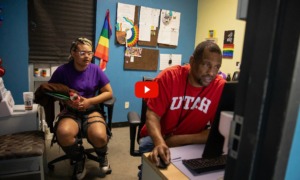AmeriCorps volunteers would get more money for education and some VISTA volunteers could work at other jobs under a bill making its way through Congress.
The changes are part of a compromise reauthorization of the Corporation for Community and National Service (CNS), which the House Education and the Workforce Committee approved by voice vote last month and which sponsors hope to see passed by Congress before the summer recess.
Dubbed “The Citizen Service Act of 2002,” the legislation (HR 4854) is based largely on Bush administration proposals to reauthorize the service agency, which oversees programs such as AmeriCorps, Volunteers in Service to America (VISTA) and Learn and Serve America.
The reauthorization was not supported by many of Bush’s conservative allies in the House, who routinely targeted the Clinton-era program for ridicule and elimination over the past eight years.
Committee leaders said the bill addresses past concerns with the corporation, mainly its poor financial history. Auditors were unable to complete their review of the agency several times in the 1990s.
“For those of us who have had problems with programs like AmeriCorps in the past, the Citizen Service Act would significantly reform federal national and community service programs to make them more accountable and effective,” said Education Committee Chairman John Boehner (R-Ohio).
Those changes did not mollify critics, who said volunteers should neither be paid nor coordinated by the federal government.
“The difference between Clinton’s AmeriCorps and Bush’s AmeriCorps is Bush’s AmeriCorps is bigger,” said Rep. Bob Schaffer (R-Colo.).
Funding was one key point of committee contention. The bill would authorize about $913 million in fiscal year 2003, roughly 11 percent less than Bush requested and about 24 percent more than current funding of $739 million.
Democrats sought to boost funding to equal the president’s request. Boehner, in a nod to budget-minded members, agreed to work with Democrats to increase funding in the Appropriations Committee. In return, Democrats agreed to drop their proposed funding amendment.
Committee members settled other issues ripe for vociferous debate before the bill hit the full committee.
For example, Bush had proposed changing the structure of VISTA by shifting some administrative and financial responsibilities from the CNS to the nonprofits that use VISTA workers, and by eliminating the federal worker status of VISTA members.
The proposal would have also allowed VISTA members – who are assigned to a nonprofit for one year and receive a “living allowance” as well as $4,725 for college or other education – to get part-time jobs or attend school during their service. Members are currently considered on duty 24 hours a day, seven days a week.
Alumni of the 37-year-old VISTA program said the elimination of federal worker status would affect seniority for members who later go into the federal civil service, as well as benefits such as insurance.
“These proposals strike a deadly blow at the heart of the VISTA program and make it more difficult for grassroots groups to sponsor VISTA projects,” the nonprofit Friends of VISTA said shortly before an education subcommittee acted on the bill.
Committee members agreed to establish a two-year demonstration program to let some volunteers out of the “24/7” requirement, with the possibility of lifting the requirement within four years. VISTA members also would retain their federal employee status.
Committee members also avoided a brawl over hiring discrimination, an issue that plagues the debate on expanding government funding of faith-based organizations. The bill would prohibit faith-based organizations from religious discrimination when hiring employees paid by CNS grants. The prohibition is contrary to an exception provided in the Civil Rights Act for religious organizations.
The language includes a grandfather clause for employees hired before the organization received federal money.
The requirement, which was included in the original authorizing legislation, did not sit well with conservative groups like the Family Research Council. “In other words, they would be forced to hire homosexuals whose beliefs and practices conflict with the teachings of their faith-based employers,” council President Ken Connor said in a letter to council members.
Rep. Bobby Scott (D-Va.) worked to ensure that the provision remained in the bill.
Other provisions would cap the federal share of program costs at $16,000 per participant (there is currently no cap); increase the amount of the education awards for AmeriCorps workers from $4,725 to $5,250; provide resources to hire or support more workers and volunteers in nearly every program; require tutors to have at least a high school diploma or to be in high school; and have 80 percent of AmeriCorps grants administered at the state level.
Pending House approval, the bill would move to the Senate where some of the GOP-supported changes are expected to get a hard look from Sen. Edward M. Kennedy (D-Mass.), chairman of the Health, Education, Labor and Pensions Committee.
Contact: http://www.cns.gov/whatshot, or http://thomas.loc.gov, enter HR 4854 in bill number box.
























